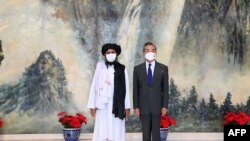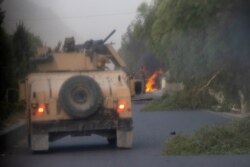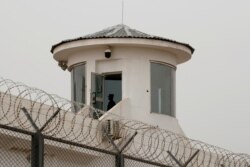Chinese Foreign Minister Wang Yi reportedly pressed the leaders of Afghanistan's insurgent Taliban group Wednesday to "make a clean break" from all terrorists, including the anti-China East Turkistan Islamic Movement, or ETIM, during a meeting he hosted.
Officials from both sides said Taliban deputy political chief Mullah Abdul Ghani Baradar, who heads the group's office in Qatar, led his nine-member delegation at the talks in the northern city of Tianjin.
The meeting, some analysts said, underscores Beijing's warming ties with the Islamist insurgent group and the Taliban's growing clout on the global stage.
"Wang pointed out that the Afghan Taliban is an important military and political force in Afghanistan and is expected to play an important role in the country's peace, reconciliation and reconstruction process," according to the Chinese foreign ministry.
The talks came as the United States and NATO have withdrawn almost all of their last remaining troops from Afghanistan. The military exit stems from Washington's landmark February 2020 agreement with the Taliban.
But the ensuing slow-moving U.S.-brokered peace talks between the insurgents and the Afghan government have failed to deliver any outcome, raising fears the intra-Afghan conflict could turn into a full-blown civil war once all foreign forces are out of the country.
"The hasty withdrawal of the U.S. and NATO troops from Afghanistan actually marks the failure of the U.S. policy toward Afghanistan," Wang said. Beijing has stressed the need for foreign forces to stage what it called a "responsible withdrawal" to ensure no security vacuum was created.
The Taliban has unleashed a widespread offensive against Afghan security forces and captured vast areas across the country since the U.S.-led coalition forces formally began their exit from the country. The deteriorating security has raised fears transnational terrorist groups could use Afghan soil to plot international attacks.
The Taliban in their deal with the U.S. have pledged to cut ties with all terrorist groups, including al-Qaida, and to prevent Afghan soil from being used to threaten American national security interests. But critics and the latest U.N. reports say the Taliban have not yet severed ties with terrorists.
"We hope the Afghan Taliban will make a clean break with all terrorist organizations, including the ETIM, and resolutely and effectively combat them to remove obstacles, play a positive role and create enabling conditions for security, stability, development and cooperation in the region," Wang said.
Baradar was quoted as assuring the Chinese hosts the Taliban "will never allow any force to use Afghan territory to engage in acts detrimental to China."
China and the United Nations have outlawed the ETIM as a global terrorist organization. The militant outfit claims to be representing and fighting for minority Uyghur Muslims in Chinese western Xinjiang region.
Beijing's crackdown against the militants has led to widespread international allegations of rights abuses in Xinjiang. China denies the charges.
The Taliban's recent onslaught has taken control of seven border crossings used by landlocked Afghanistan for trade with neighboring countries. Those countries include Tajikistan, Turkmenistan, Iran, China and Pakistan, effectively depriving the beleaguered U.S.-backed Afghan government of millions of dollars in customs revenues.
Insurgent leaders have traveled to all of those countries, barring Pakistan, in a bid to assure their respective governments that Taliban advances have remained within the Afghan territory and do not threaten the regional stability.
Wang emphasized the need for warring Afghans to negotiate a peace arrangement to bring security to their war-ravaged country and ensure regional stability.
"The Afghan Taliban has the utmost sincerity to work toward and realize peace. It stands ready to work with other parties to establish a political framework in Afghanistan that is broadly-based, inclusive and accepted by the people and protect human rights, especially rights of women and children," Baradar said.
While the Afghan government objected to the Taliban's recent visits to neighboring countries and Russia, the foreign ministry said Wednesday that Beijing informed Kabul in advance on the insurgents' two-day visit to China.
"With a U.S. exit from Afghanistan and the inability of [Afghan] President Ashraf Ghani to secure the country's borders, neighbors and regional powers have to hedge their bets regarding the future," said Torek Farhadi, a former Afghan government adviser.
"While the Taliban give promises of security to Afghanistan's neighbors, Kabul keeps asking for help. This perception of an embattled President Ghani doesn't make for good looks," Farhadi noted.






